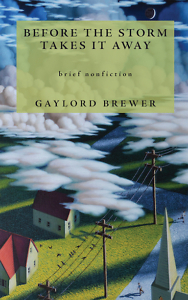Prolific Murfreesboro poet Gaylord Brewer turns his hand to short nonfiction in Before the Storm Takes It Away, his latest from Red Hen Press. While the structure of the 125 pieces here may project Brewer’s voice in a different light, Brewer’s fans and new readers alike will relish the opportunity to walk with the poet on his personal journey through the seasons of the year captured in this collection.

As it happens, the year chronicled in Before the Storm Takes It Away rises to its conclusion during the spring of 2020, amid the early ravages of shock, uncertainty, and grief created by the COVID-19 pandemic. While the publisher describes the collection as “the author’s pandemic book,” categorizing it primarily in that fashion might sell it short by a considerable distance. To leave no doubt about the beauty of the other elements Brewer offers, I’ll devote the space here to them, with an appreciative nod to the chilling authenticity and memories provoked by the pandemic pieces.
For sheer surprise and quirkiness, the pieces on cooking stand alone among the wide subject variety in this chronicle. They may inspire the reader (and indeed, this writer) to hasten to order a copy of Brewer’s earlier The Poet’s Guide to Food, Drink, and Desire for more of the same. I mean, who isn’t curious, even if mildly repulsed, by a recipe for Blood Loaf? The first ingredient is three cups of blood, suggested sources being duck, rabbit or pig. And then there’s the Goat’s Milk Caramel, this one a hymn to the soul-stirring process as much as the product that results. “This will be an hour of your life, its currency spent as well in this manner as most, better than many. The agency of the task, the transformation to a commodity of pleasure, a gift to be given.” But then the task is done, and “Oh, the rich reward… Forget everything you’ve tasted before.”
Throughout the stories, Brewer weaves in the particular laments of the writer’s life, while being excruciatingly pointed in describing himself as a “lucky bastard” with “no cause for complaint, no claim for grievance.” He relates the story, in a tender remembrance, of his late friend, poet Arthur Smith, reading to a completely empty room at a music and literature festival where a prominent, simultaneous headliner drew everyone away. Smith later dismissed Brewer’s incredulity. “Hey, guy,” Smith said, “I had a contract.” Still, some of these author tales wind to a (somewhat, it appears) satisfying ending: After a polite but somewhat tepid response to a reading at a village Midnight Sun Festival in Finland, Brewer “correctly surmised that my famous droll persona might not survive translation” but counted the experience a victory, with its compensation (literally) of moose meat and vodka.
 Brewer’s intense connection to the natural world is apparent throughout, in reflections on gardening (with a remarkable collection of daylilies), climate change, and the culinary glory in the bounty of local food producers. This connection is perhaps most poignant in stories of living creatures, for whom his sense of responsibility reaches into the marrow of his bones. Why else the extraordinary self-loathing in “Grasshopper”? Out on a habitual walk, Brewer casually inspects a handsome grasshopper, nudging it with his shoe into the lane of traffic, resulting in its death. His wrenching guilt echoes painfully: “I was home, another death on my hands. For what? For stupid play? For insolence? An adult grasshopper may live two months. A foolish man, many decades.”
Brewer’s intense connection to the natural world is apparent throughout, in reflections on gardening (with a remarkable collection of daylilies), climate change, and the culinary glory in the bounty of local food producers. This connection is perhaps most poignant in stories of living creatures, for whom his sense of responsibility reaches into the marrow of his bones. Why else the extraordinary self-loathing in “Grasshopper”? Out on a habitual walk, Brewer casually inspects a handsome grasshopper, nudging it with his shoe into the lane of traffic, resulting in its death. His wrenching guilt echoes painfully: “I was home, another death on my hands. For what? For stupid play? For insolence? An adult grasshopper may live two months. A foolish man, many decades.”
In “Contrition,” Brewer relates the unbearable tension of awaiting news of his beloved Lucy while the dog undergoes potentially lifesaving surgery. In a gesture of solidarity even he didn’t fully grasp at first, Brewer steps into his bathroom and shaves off his beard, one detailed step at a time, while waiting for an update, knowing when “they were about to cut into her.” Lucy survived the procedure, and upon her return home, he reflects: “I think I understood then what I tried to do. However irrational, however foolish. We were in this together.”
Perhaps most compelling of all within Brewer’s astonishing depth and breadth of craft in this collection is the exquisitely beautiful rendering of tiny, specific, memorable moments. In “Actual Winter Morning” he writes: “How ridiculous and transparent is happiness, how sudden and unapologetic. The dark mood receded, my obsession with the losses of the next years not dispelled, but contained, abstracted. The losses will wait. … There’s Claudia. There’s Lucy. Here am I. Legs working. Heart working. Breath steady. Eyes to see. Lips to speak. Ears to listen. This instant of eternity. Alive. Alive. Alive.”

Eve Hutcherson started writing as a journalist covering Thoroughbred horse racing for an international trade publication. She has since published on topics ranging from vintage car shows to healthcare, and her current work focuses on the unexpected and often humorous side of grandparenting and midlife. She lives in Nashville.
Tagged: Book Reviews





